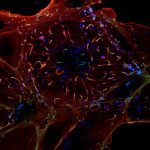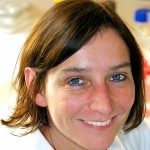The selected candidate will develop a new microfluidic culture device capable of recapitulating the physiological and morphological properties of human organs or tissues. The global aim of the project is to advance the “organ-on-chip” field by reconstituting faithful mimics of human 3D tissue interfaces (endothelium, stroma and epithelium). Practically the project entails achieving good epithelialization of soft culture substrate. In a second step the selected candidate will have to develop strategies in order to vascularize the produced interfaces within a microfluidic device. Application in the field of intestinal infection with human foodborne pathogens and gut microbiota will be pursued.
- Activities
The selected candidate will first need to curate relevant library of mammalian cells (both primary cells and established lines). Genetic engineering approaches might be implemented in order to develop quantitative cell-based assays. The project will also require designing and performing experiments employing advanced hydrogel systems for 3D cell culture. Finally the successful integration of these matrices into microfluidic chips will be investigated.
- Knowledge
A good expertise in the fields of 3D cell culture in synthetic hydrogels or in microfluidics or in mammalian cell biology is required. Good notions of bioconjugation techniques would be appreciated.
- Skills
The candidate must be highly motivated, creative and capable of independent thinking. He/she should be interested in the development of technology for biomedical research. The candidate should be capable of working autonomously and as part of a team. Good communication skills would be a strong plus.
- Education
The candidate should have a Masters degree (or equivalent) in bioengineering, cell biology or in the field of biomaterials.
- Labs
The Biomaterials & Microfluidics group was launched in April 2015 as a funding member of Citech’s incubator program. The objective of the platform is to bridge biology and engineering in order to help the development of biomedical projects with a strong technological focus. We pursue an independent research line focusing on technological development in the field of Organ-on-Chip, advanced stem cell based assays and 3D scaffolds. The team of Nathalie Sauvonnet is part of the Molecular Microbial Pathogenesis unit (Pr. Philippe Sansonetti) at the Institut Pasteur. The team has expertise in bacterial pathogenicity (Shigella flexneri) and microbiota exploration as well as in cell biology and gene editing.
Applicants should send their CV, a summary of previous research experience and if possible the names of two references to Samy Gobaa (samy.gobaa@pasteur.fr) or Nathalie Sauvonnet (nathalie.sauvonnet@pasteur.fr)
Funding body: Région Ile-de-France, Start: Summer 2018, Duration: 3 years.




